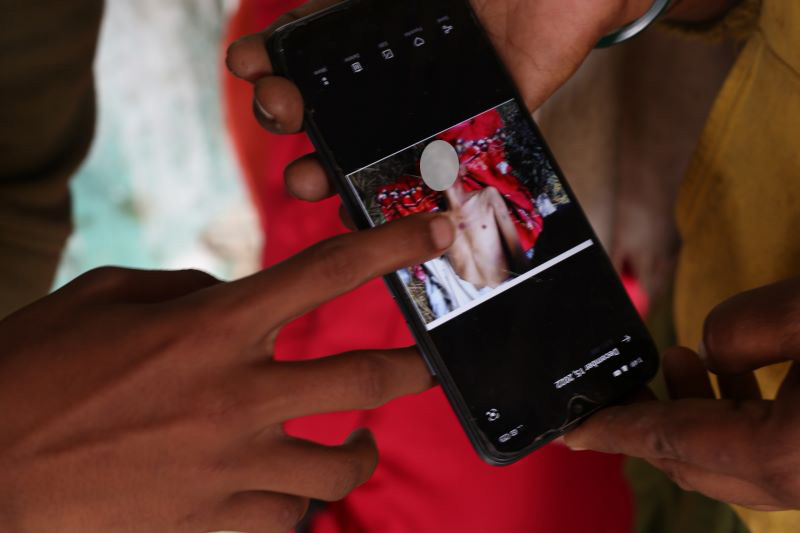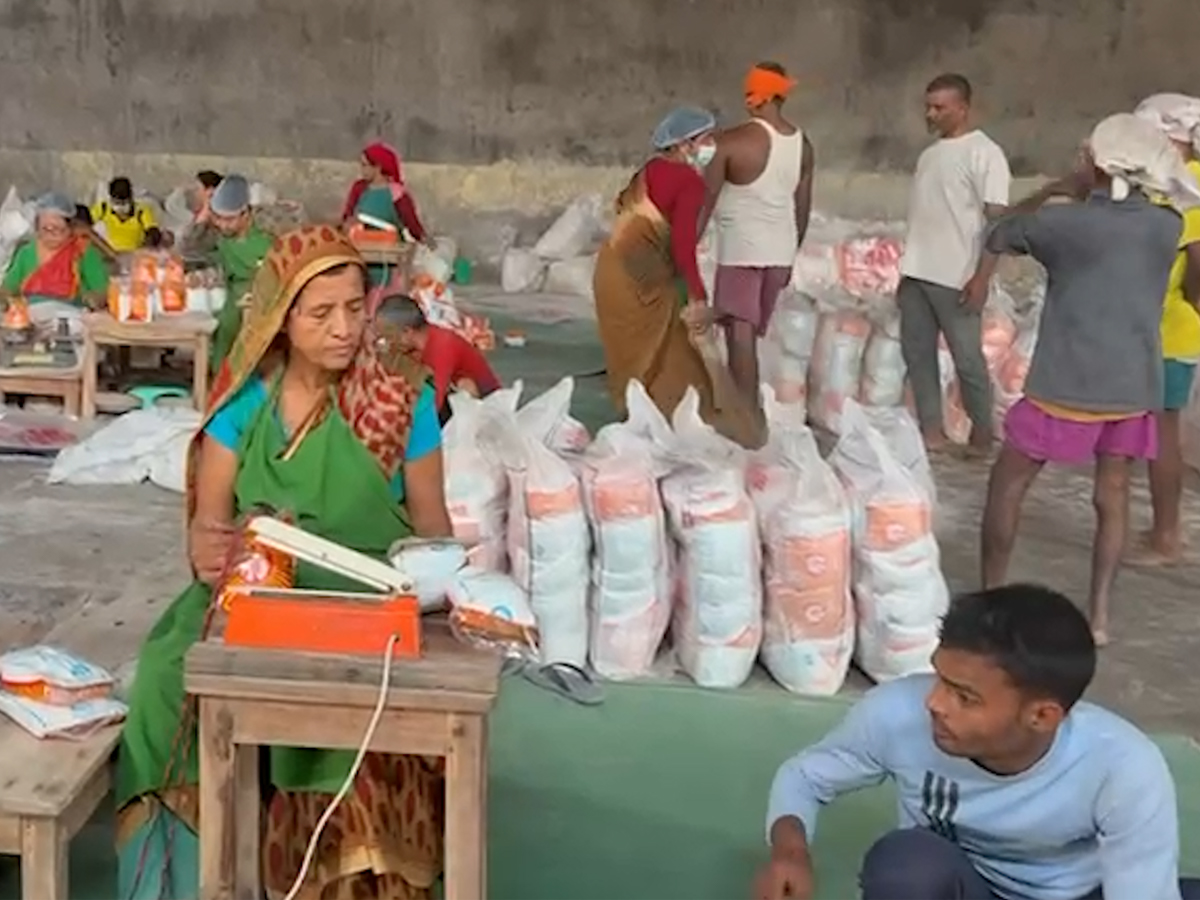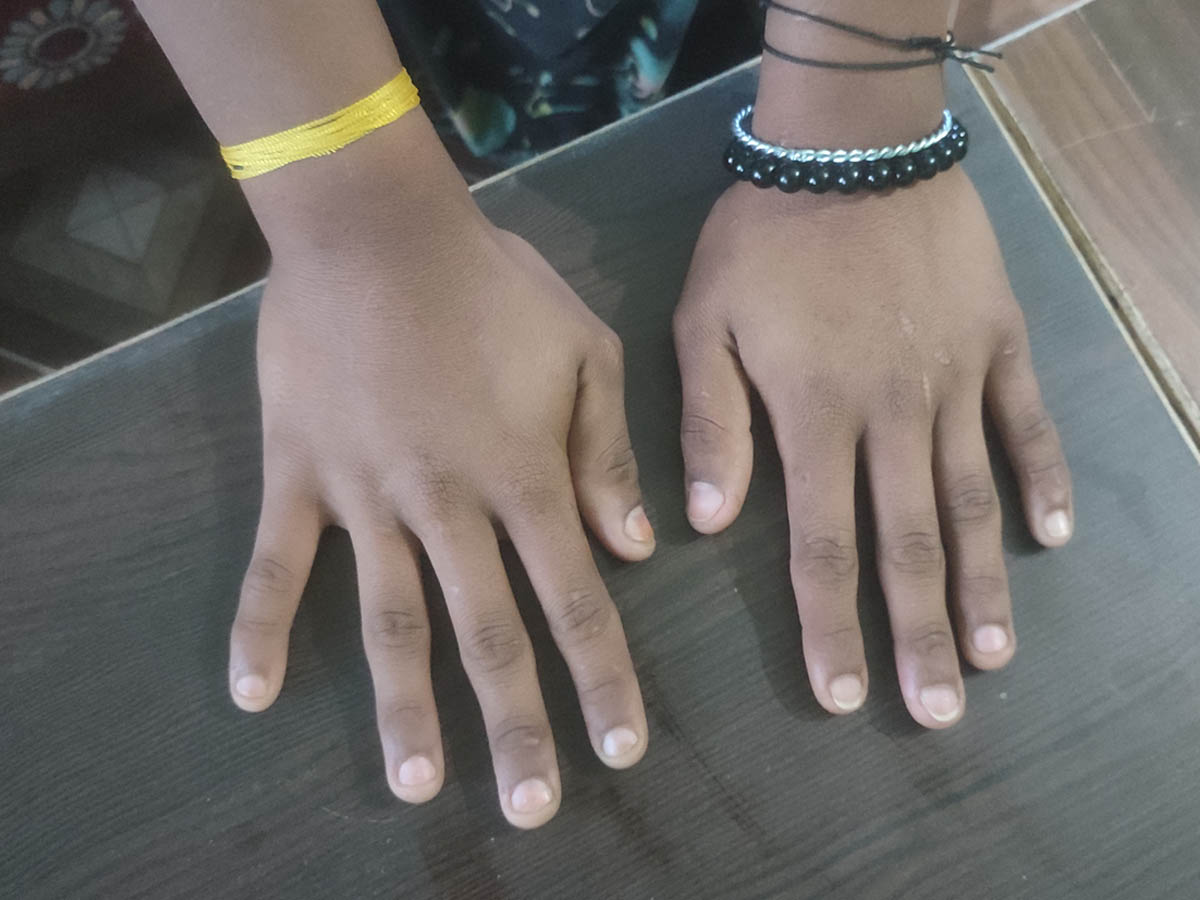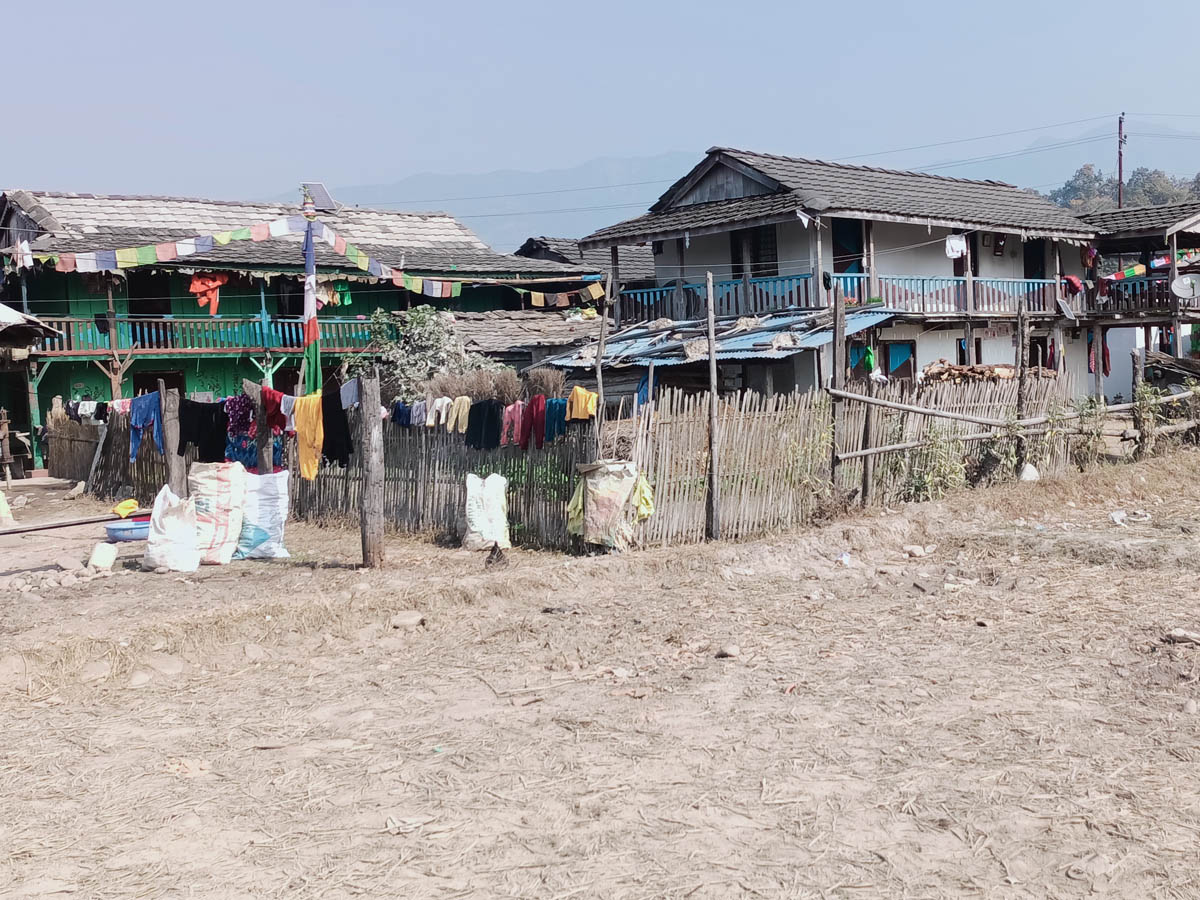Read Part I: Young Badi Girls Trafficked Into Prostitution | आमाबाबुले नै यौन व्यवसायमा धकेल्छन् बादी किशोरीलाई (In Nepali)
The bazaars in the town of Lamki, situated in the far-western region of Nepal, are usually drowned in the daily buzz of vehicles honking through the busy East-West Mahendra Highway. Approximately 13 kilometers from Lamki lies one of the oldest settlements of that region—an infamous bazaar of Badi people called the Muda Bazaar. It is a noisy little hamlet with people coming and going every other day. The mini taverns and eateries attached to personal houses serve as stopovers for those who enter Muda not just in search of food but everything else.
 Muda is an unlicensed red-light area in Kailali. Though prostitution is criminalized in Nepal, the Badi people of Muda have been indiscreetly engaged in prostitution for generations. In the process, many parents have long lost their morality sending away their daughters to brothels in India or have given them at the hands of procurers. Under the sheen of hotels and eateries lurks the business of young girls being made to familiarize with the job. “There are two ways actually – either the girls in their early teens are themselves willing to join the sex trade or are emotionally influenced or coerced into doing it,” says Gayatri Badi, 62, a local of Muda.
Muda is an unlicensed red-light area in Kailali. Though prostitution is criminalized in Nepal, the Badi people of Muda have been indiscreetly engaged in prostitution for generations. In the process, many parents have long lost their morality sending away their daughters to brothels in India or have given them at the hands of procurers. Under the sheen of hotels and eateries lurks the business of young girls being made to familiarize with the job. “There are two ways actually – either the girls in their early teens are themselves willing to join the sex trade or are emotionally influenced or coerced into doing it,” says Gayatri Badi, 62, a local of Muda.
After hours of talking, Gayatri finally takes me to an empty room with just a bed and a window sans curtains. As we enter the room she asks if she is on camera.
Gayatri was a sex worker herself but she has ensured that her grandchildren do not follow in her footsteps. “In our village here, almost every house has underage girls who are into prostitution. The parents solely survive on their daughters’ earnings and if need be, take them to India to explore more networks. Parents are happy when a daughter is born and if the daughter is fair and has a good physique, her demand rises and so does her earnings,” says Gayatri.
Previously, there were many cases of trafficking whereby girls were sold off by their parents or neighbors unknowingly. “But these days the number of outsiders who are involved is less and the girls are either taken across the border by their parents or they go themselves,” reveals Gayatri.
Gayatri shares there are about 20-25 young girls, including a few minors, who are into prostitution in Muda. Each of them takes 15-20 customers a day. The initial charge taken from each client is Rs 3,000 but after paying for the rent of the room and the Rs 1,000 that the parents take, the girls receive Rs 1,000 from each client they bring.
Reminiscing the time when she was also involved in the sex business, Gayatri mentions it is a lot tougher these days as there are more chances of being abused by customers who come intoxicated. During her days, she says she made sure the sex workers were provided with free HIV check-up and medication.
The plight of Muda can be ascertained from the fact that a few years ago a government school in Kattipur asked parents in Muda to send their children to school. As some parents had forced their children to drop out of school and engaged them in sex work, the school had sent letters to the parents. To this day, the school attendance record in Kattipur shows a large dropout rate among Badi children, especially girls.
“It is rather sad but a prostitute raises another,” says Gayatri, adding, “It is rare for a daughter of a prostitute to want to become anything other than a prostitute. Without sending young girls to school or showing them other alternatives, this sordid trend is not going to end.”
Gayatri runs a liquor shop in Muda that serves customers, a majority of those come from near the Indian border in private cars.
Otherwise a noisy stretch, the highway and shops in Muda wore a deserted look last year after a man, Lal Bahadur Bohara who ran an eatery next to the Badi settlement was beaten to death late at night. The deceased man’s wife, Poonam Bohara, recalls the night when a few drunk men who had come to Muda as customers in their private car brutally beat her husband after he asked the intoxicated men to stop making noise at such odd hours.

“My husband died of injuries the next morning in a hospital in Nepalgunj. I filed an FIR (First Information Report) in the police station but it was meaningless,” says Bohara. “There are CCTV cameras installed on the highway and if the police really wanted, they could have nabbed the culprits through the footage but they did nothing.”Following the particular incident, the District Police Office of Bauniya Rural Municipality and the locals of Muda approached an agreement to curb prostitution in Muda as it has fueled numerous illegal activities in the community. “We have tried to stop such activities in the past but to no avail. We can neither stop customers from visiting the eateries nor unethically ask the police to conduct a raid without any formal complaint or order,” says Mithun Gautam, Ward Chairperson, Bardagoriya Rural Municipality.
The District Police Office did set up checkpoints a few years ago but it has had no positive impact on the community. Locals say such efforts to curb prostitution and trafficking have been initiated in the past but to no avail. "Badi people in Muda have earned a fortune through this, so why would they be willing to let go of this?” says Bohara.
Locals and neighboring communities believe that such illegal businesses are being run with the support of people in influential positions. They say there is nothing that can be done when the perpetrators of such illegal activities are protected by powerful people.
“What needs to be pondered upon is how one of the most vulnerable groups in the country can hold such power to run sex businesses and forced prostitution which are deemed illegal by the country’s law?” asks Gautam.
Bohara says many people come to Muda in private vehicles. She says that they come and drink and create havoc all night while the community people nearby are compelled to suffer.
After the group of people, who Bohara recognizes as clients of Muda, beat her husband to death, local police barred entry for outsiders into the community.
Following the attack, the police confiscated illegal liquor from the homes and shops of Bardagoriya locals. An agreement has been signed between Muda locals, police and officials of Bardagoriya Municipality to put an end to the illegal business of prostitution. But Bohara says it was an act to quell peoples’ anger for just a while and so it happened.
Over a year after the incident, Bohara says the case is now dismissed and the alleged victims have been released because the police said they have no strong evidence against the men who were held in detention. “The police restriction to enter Muda was temporary. The bazaars of Muda are now back to its old business,” says Bohara.
Badi as entertainers
Muda, a notorious town, has witnessed the practice of prostitution for ages, longer before the Badi began settling there. Around 1995/96, the struggle and revolution of Badi people in Nepalgunj against systematic discrimination led them to migrate to Muda and Surkhet. When they migrated to Muda the trend of visiting certain cities in India for labor/employment started to grow.
According to a report, Badi people are historically known to be entertainers who used to sing and dance, and entertain rulers and aristocrats of ancient Nepal. The word Badi is believed to be derived from the Sanskrit word ‘badhyabadak’, which refers to a person making or playing local musical instruments like madal, tabala and sarangi. Back then, when Badi people served kings and aristocrats they were not considered untouchables. Later with the downfall of the royals, the Badi lost their space in palaces as entertainers. Not only did they start facing financial challenges but their social status also took a major beating. They were discriminated against by both non-Dalits and so-called upper Dalits.
Since Badi people were performers and entertainers, they lived a nomadic life travelling from place to place. ”And as a result they did not have access to any land. Later, disputes arose on land rights and ownership and although there were agreements signed between them and the then Government, the Badi were never provided land,” says researcher and one of the report authors, Gopal Nepali.
In 2006, they launched a historic movement with women taking to the streets in petticoats to demand their socio-economic rights. Their demand was for prostitution to be either legalized or for Badi women to be rehabilitated and provided employment opportunities to live with dignity. However, despite the then government and Badi people signing a two-point agreement, their demands have not been implemented till date.
The two-point agreement promised to put a ban on derogatory words/speech used for Badi people and provide citizenship certificates to all the Badi across the country. It also agreed upon providing scholarships to Badi children. Though there was a provision in the agreement to provide scholarships to Badi children, it has remained on paper only. This could be an underlying reason why Badi girls and women are stuck in the web of prostitution as they do not have the means to a proper education.
The Badi of Muda have an abundance of wealth. All they need is a shift in their mindset. Bhumi Prasad Sharma, Principal of Balkanya Madhyamik Bidhyalaya, Kattipur, explains the scenario of school dropouts among the Badi children and youth in Muda. He says the student dropout rate among the Badi community in the area has increased exponentially. This, he says, could be due to two reasons: Either their standard of living has increased or these children have stopped attending school because they do not have a say in the choices they can make.
This interview was conducted in the Badi community in Balchaur and while the author was there she noticed that a group of children in their school uniforms returned home from the bus stop with depressed faces. It is a 20-minute ride from their homes to the nearest school and they take the public transport for their daily travel. However, the students said that the public transport on that route rarely stops for these children. And like on many other days, that morning too they could not attend school because not any of the public transports did stop for them. Yasodha Badi (name changed), an activist based in Balchaur says Badi people face such discrimination on a daily basis “but it is disheartening to see it happening to the community children.”
Since time immemorial, Dalits have not had the privilege to enjoy basic rights and resources. Dalits do face discrimination at the hands of non-Dalits but for the Badi it is even worse as they face further discrimination from so-called upper-class Dalits. This discrimination is reflected in their choices and way of living. “We have learnt to live with it. As Badi sex-workers, we are looked down upon. The organizations that said they would work to restore the rights of the Badi after the revolt have gradually disappeared over the years,” says Yasodha Badi.
In 2016, Bharat Nepali from Badi Samudaye Uthan Bikas Samiti visited Muda community under a traineeship and fund distribution program led by Nepal Government. The program provided funds to a few Badi people so as to help them to initiate start-ups. Just a few days of observation was enough for him to see through the notoriety of Muda. Every day, he could see young girls within the community covered in heavy make-up. “There was not a single day when I saw them without their make-up,” he shares.
Nepali shares an experience of an underage Badi girl named Mamata (name changed) who had eloped with a guy. The parents were on the lookout for the couple and they eventually tracked down them down. “The parents then coerced her into the sex business,” said Nepali adding further, “Young girls are constantly fed with the thought of being able to make money through prostitution. The whole idea has become so normal that more than finding it immoral, their minds are consumed by the economics of it.”
To date, there have been many efforts made to put an end to the sex business in Muda. Even a police checkpost was established close by but there are no police to patrol the area. “Why would the police or local authority bother to disrupt a business through which they too receive benefits?” asks Nepali.
Nepali says this is an unending web of business that runs under experienced and influential people at the higher levels whereby everything happens under their noses. He says, “Young girls are taken to cities in India and deals are done for high prices. This starts as a preliminary process to introduce new faces and build clients. There is a give and take of huge money when they are deflowered and the girl is returned to her home from where her journey as a prostitute professionally begins.”
(This story was published with support from Humanity United.)
Read our Republishing Policy here.



